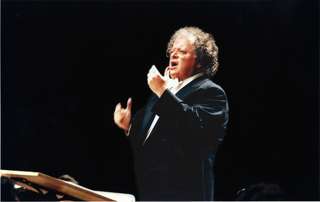|
Back
The Moveable Feast New York
Zankel Hall, Carnegie Hall
01/10/2010 -
Milton Babbitt: The Head of the Bed
Elliott Carter: Syringa
Richard Strauss Der Bürger als Edelmann Suite Op. 60 (Suite from “The Bourgeois Gentleman”)
Judith Bettina (Soprano), Kristin Hoff (Mezzo-soprano), Evan Hughes (Bass-Baritone)
The MET Chamber Ensemble, James Levine (Artistic Director and Conductor)

J. Levine (© The MET Orchestra)
Metaphorically, Sunday afternoon’s concert was like a memorable tri-partite dinner party. The first part was an oration, obviously eloquent, but spoken in a most exotic language. The second part was a scholarly argument which turned emotional at times, but was always clear and rational.
After an intermission, the third part was the dinner itself. Musically light, frothy, a meal of broths and the freshest vegetables (prepared al dente by the chef), ending with a soufflé of wondrous tropical fruits.
Specifically, Maestro James Levine started with Milton Babbitt’s abstruse yet curiously likeable The Head of the Bed, sung and mainly played by the soprano and quartet who premiered it four years ago. Having heard of it since that time, I was anxious to listen carefully. The question, though, was whether to listen or to read the complex 225-line poem by John Hollander, a kind of Finnegan’s Wake synopsis of sleep, dreams, myths and waking again. Judith Bettina is a marvelous soprano, but not only was it impossible to decipher the words, but the deconstructed singing line had nothing whatsoever to do with the poem.
Ms. Bettina’s voice, leaping constantly from a B flat below the staff to a high A, was confident and, as much as possible melodic. Her confidence was shared by the four splendid soloists: Tara Helen O’Connor on flute, Anthony McGill, clarinet, Rolf Schulte, violin, and Michael Nicolas on cello. Moreover, Mr. Babbitt, by changing the timbres, textures and groupings for each of the 15 15-line stanzas, offered the color and even flamboyance which held the attention.
The negative side was that Mr. Hollander’s poem itself was so intriguing–complex yet logical, with lyrical, carefully metered lines–that the music seemed extraneous, a kind of intrusion on the words. I confess that I never studied the score, felt no particular structure (except Ms. Bettina’s intervals), yet it was never boring.
No reservations, though, for Elliott Carter’s Syringa, though on paper the two languages of the singers seems foreboding. Still, I feel stupid writing about it, since Mr. Carter wrote Syringa when a mere lad, a stripling of 70 years old.
This was another excellent poem, about Orpehus, by John Ashbery, but Mr. Carter composed a simultaneous set of songs in Greek (translated in the program). The orchestra had increased to 11, and both singers gave vehemence and sometimes agitation to their melodies. Nor was this the abstraction of Mr. Babbitt’s work. When bass-baritone Evan Hughes sung (in Greek), “Oh! Oh! Evil!!”, the voice rose and trembled. When he sung of the “dream in black night”, the orchestra went into a measured chaos. When Kristin Hoff sung of Orpheus having “no regrets at all”, it was calm, while the guitar picked out dropped notes for the “record of pebbles along the way."
Scanning both poems before the concert, I read it completely on the subway after the concert, and, yes, was so taken by the words, that the music was, perhaps, almost a supplement to such verbal splendor.
(Incidentally, the still cherubic composer, going onto his 102nd year, was happily in attendance and bravoed the performance.)
The final course was literal, since the last movement was a dinner. Richard Strauss’s Bourgeois Gentleman has gone through dozens of incarnations since the 17th Century premiere of the Molière play with music by Lully. Strauss’ version, for chamber orchestra can be a delight, or mere ephemera. With James Levine, it was an essay in effervescence.
Sitting on his high-chair, Mr. Levine beat complex time for the Babbitt, conducted the orchestra in the Carter. For the Strauss, one saw a certain advantage in sitting down. Not merely his hands, not (presumably) his face, not only the body, but his feet themselves danced about on the rungs of the chair, with all the electricity and rhythm and love of this wonderful combination of 17th, 18th and 20th Century birthday cake.
Finishing the three courses, I imagine that all in the audience–a blue-ribbon event with nearly every New York composer in attendance–would have felt privileged to attend.
Harry Rolnick
|